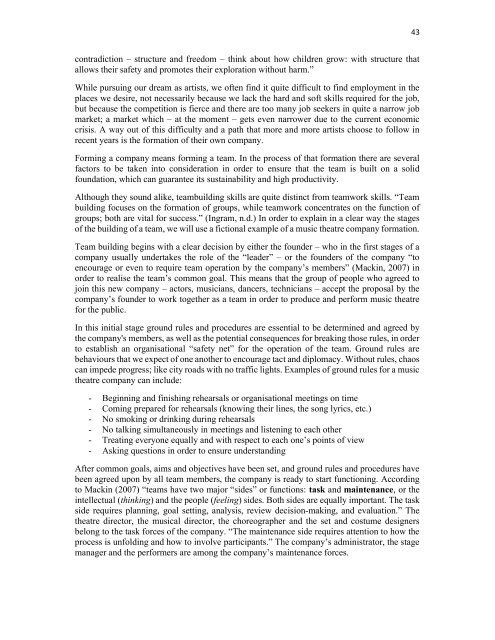and Music
Omega-Book
Omega-Book
You also want an ePaper? Increase the reach of your titles
YUMPU automatically turns print PDFs into web optimized ePapers that Google loves.
43<br />
contradiction – structure <strong>and</strong> freedom – think about how children grow: with structure that<br />
allows their safety <strong>and</strong> promotes their exploration without harm.”<br />
While pursuing our dream as artists, we often find it quite difficult to find employment in the<br />
places we desire, not necessarily because we lack the hard <strong>and</strong> soft skills required for the job,<br />
but because the competition is fierce <strong>and</strong> there are too many job seekers in quite a narrow job<br />
market; a market which – at the moment – gets even narrower due to the current economic<br />
crisis. A way out of this difficulty <strong>and</strong> a path that more <strong>and</strong> more artists choose to follow in<br />
recent years is the formation of their own company.<br />
Forming a company means forming a team. In the process of that formation there are several<br />
factors to be taken into consideration in order to ensure that the team is built on a solid<br />
foundation, which can guarantee its sustainability <strong>and</strong> high productivity.<br />
Although they sound alike, teambuilding skills are quite distinct from teamwork skills. “Team<br />
building focuses on the formation of groups, while teamwork concentrates on the function of<br />
groups; both are vital for success.” (Ingram, n.d.) In order to explain in a clear way the stages<br />
of the building of a team, we will use a fictional example of a music theatre company formation.<br />
Team building begins with a clear decision by either the founder – who in the first stages of a<br />
company usually undertakes the role of the “leader” – or the founders of the company “to<br />
encourage or even to require team operation by the company’s members” (Mackin, 2007) in<br />
order to realise the team’s common goal. This means that the group of people who agreed to<br />
join this new company – actors, musicians, dancers, technicians – accept the proposal by the<br />
company’s founder to work together as a team in order to produce <strong>and</strong> perform music theatre<br />
for the public.<br />
In this initial stage ground rules <strong>and</strong> procedures are essential to be determined <strong>and</strong> agreed by<br />
the company's members, as well as the potential consequences for breaking those rules, in order<br />
to establish an organisational “safety net” for the operation of the team. Ground rules are<br />
behaviours that we expect of one another to encourage tact <strong>and</strong> diplomacy. Without rules, chaos<br />
can impede progress; like city roads with no traffic lights. Examples of ground rules for a music<br />
theatre company can include:<br />
- Beginning <strong>and</strong> finishing rehearsals or organisational meetings on time<br />
- Coming prepared for rehearsals (knowing their lines, the song lyrics, etc.)<br />
- No smoking or drinking during rehearsals<br />
- No talking simultaneously in meetings <strong>and</strong> listening to each other<br />
- Treating everyone equally <strong>and</strong> with respect to each one’s points of view<br />
- Asking questions in order to ensure underst<strong>and</strong>ing<br />
After common goals, aims <strong>and</strong> objectives have been set, <strong>and</strong> ground rules <strong>and</strong> procedures have<br />
been agreed upon by all team members, the company is ready to start functioning. According<br />
to Mackin (2007) “teams have two major “sides” or functions: task <strong>and</strong> maintenance, or the<br />
intellectual (thinking) <strong>and</strong> the people (feeling) sides. Both sides are equally important. The task<br />
side requires planning, goal setting, analysis, review decision-making, <strong>and</strong> evaluation.” The<br />
theatre director, the musical director, the choreographer <strong>and</strong> the set <strong>and</strong> costume designers<br />
belong to the task forces of the company. “The maintenance side requires attention to how the<br />
process is unfolding <strong>and</strong> how to involve participants.” The company’s administrator, the stage<br />
manager <strong>and</strong> the performers are among the company’s maintenance forces.


